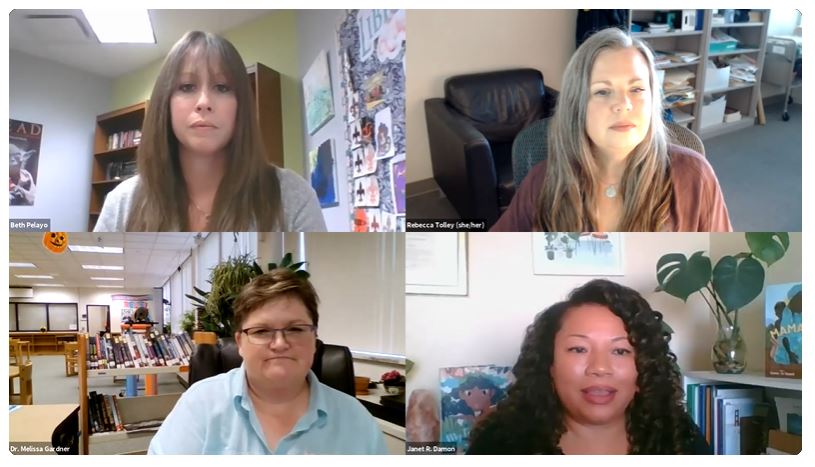Trauma-Informed Librarianship: Supporting Students and Community | SLJ Summit
From creating SEL book displays to leading nature outings that help heal historical trauma, SLJ Summit panelists described ways they support students.
When COVID closed down schools in the spring of 2020, librarian Janet Damon worried about the students and families in her Denver Public Schools who were suddenly cut from friends, teachers, and other parents. She knew that losing the support of their social networks during a stressful time would have very real mental health impacts.
 |
Clockwise from top left: Beth Pelayo, Rebecca Tolley, Janet Damon, and Dr. Melissa Gardner speak at the SLJ Summit. |
Damon couldn’t open the schools, but she could unlock the healing power of the outdoors—and she was lucky enough to live in a beautiful state where the governor was encouraging residents to make the most of its parks. She started a series of nature and literacy events in parks and natural settings in the summer of 2020 that included book giveaways, STEM and ecological learning, kayaking, canoeing, and splashing in streams. The first summer, her program reached 300 participants, and there were even more when she brought it back in 2021.
“We know about the reduction in cortisol and the increase in our own immune systems from being out in green spaces,” said Damon, senior manager of library services for Denver Public Schools. “Going to the state parks and going to outdoor spaces was a place where people could find connection.”
Librarians have powerful tools that can be transformative to students experiencing trauma, according to Damon and her co-presenters on the Trauma-Informed Library Services panel at the SLJ Summit on October 28. Led by moderator Rebecca Tolley, a librarian at East Tennessee State University and author of A Trauma-Informed Approach to Library Services (ALA, 2020), the panelists shared creative practices for implementing library services that support students who have had traumatic experiences. Advocates say that trauma-informed schools and libraries are necessary because any child who walks through the doors may be bringing a traumatic experience with them, and data suggests that a third or more of children have experienced at least one traumatic adverse childhood experience (ACE).
“There are two types of recognized trauma: physical injury to the body that would be treated in an emergency room, and psychological trauma, which includes the impact of maltreatment, interpersonal violence, and catastrophic events like economic crisis, accident, or illness,” Tolley told viewers during the free, virtual event. “Overwhelming childhood experiences leave the child/tween/teen’s brain constantly perceiving danger, so everything else except physical survival becomes secondary.”
For panelist Beth Pelayo, trauma-informed library services mean lowering barriers that might keep students from the resources they need. At St. Charles (IL) East High School, where she is a media specialist, Pelayo has eliminated late fines, allows students to check out books even if they have misplaced their student IDs, and provides Chromebook chargers for kids to use in the library. The way she sees it, a student who is having trouble at home might have trouble keeping track of their school ID, and they should still have access to books even if they’ve moved recently or are dealing with family upheaval. And a charged laptop might take just one worry off their plate for the day. She also sets up monthly social and emotional learning displays and craft bags for the students.
“It all connects back to our whole idea of responding to your patrons, whether it’s the community or the students themselves,” Pelayo said.
The stakes could not be higher, with the COVID crisis amplifying trauma. Mental health emergency room visits increased by 24 percent for children ages 5 to 11 and 31 percent for children ages 12 to 17 between March and October of 2020, Tolley said. And mental health risk is disproportionately spread through the population: LGBTQ+ people and Native Americans have an elevated risk of suicide, and the suicide rate of Black children is increasing as the rate of white children falls, according to Tolley.
For Damon, creating antiracist spaces to counteract historical trauma was a key part of her nature and literacy events. Children learned about Black ecologists and visited Lincoln Hills, a historic Colorado vacation community for Black families once visited by Langston Hughes and Count Basie. Once, when children played in a stream, the parents talked about how they never had the opportunity to swim as kids because of the legacy of Jim Crow segregation their own parents had experienced in the South.
“The children got to learn about how we reclaim and heal our relationship with nature,” Damon said.
For Campbell County Middle School librarian Melissa Gardner, trauma-informed services are about giving children agency. The Alexandria, KY, librarian has been cataloging books with themes related to different ACEs so students can encounter characters facing the same challenges they are and realize they’re not alone.
“One of the things students coming to the library get that they may not get in the classroom is choice,” Gardner said. “I think it’s something that many of the students [lose] when they’re facing some sort of trauma; they lose that choice. I think coming to the library gives them that sense of being able to be in control for once.”
RELATED
The job outlook in 2030: Librarians will be in demand
The job outlook in 2030: Librarians will be in demand
ALREADY A SUBSCRIBER? LOG IN
We are currently offering this content for free. Sign up now to activate your personal profile, where you can save articles for future viewing





Add Comment :-
Be the first reader to comment.
Comment Policy:
Comment should not be empty !!!